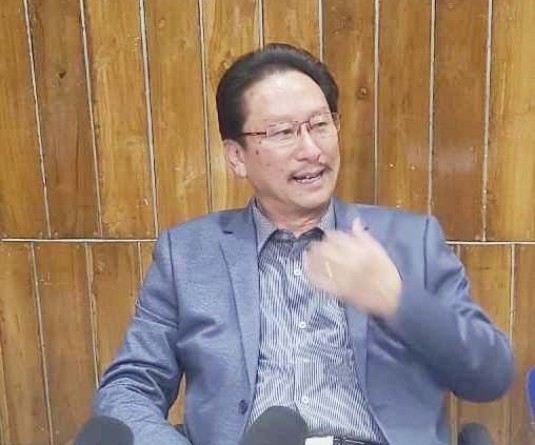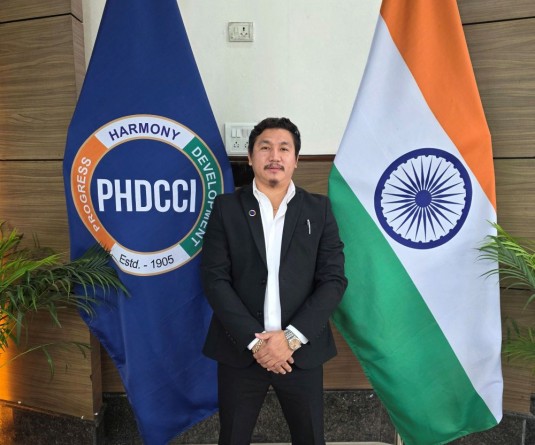
Our Correspondent
Kohima | July 4
LH Thangi Mannen, founding member Green Team Kohima today said that the importance of sustainable waste management in the state cannot be understated especially in view of the problem of plastic pollution which is now being considered as second to the problem of climate change amongst the most serious crisis facing humanity today.
Speaking at the one day seminar on waste management with special reference to Kohima here organized by environmental studies department and Eco Club of Alder College Kohima, she said that there is an urgent need to explore real solutions that are sustainable and community based.
“Our practice of just rolling the garbage down the hills or throwing anywhere and everywhere is no longer sustainable with long lasting environmental and health impacts,” she said adding that with the increase in population and waste volume, these impacts will be more severe or even irreversible.
She said the consequences of these unsustainable actions are not just about pollution and increasing disaster risks, there are also about social justice.
On Solid Waste Management (SWM) Rules, 2016 /18, Mannen said that Government of India has given clear guidelines for sustainable waste management, the mandate of which goes beyond municipal areas.
“This rule in conjunction with Plastic Waste Management Rules, 2016 (GOI) and various other relevant rules spell out clearly a host of practices that are to be implemented for ensuring proper waste management,” she said.
In compliance with the National Green Tribunal orders and the GOI’s SWM Rules 16-18, the Government of Nagaland has on April 8, 2019, also notified its Nagaland Integrated Waste Management Policy 2019 (NIWMP), to attain sustainable waste management throughout the state by 2030.
Govt rules and policy
She also highlighted the guiding principles of government rules and policy.
On “No burning” principle, she informed that burning may be seem as a quick solution for waste disposal but burning of waste produces toxic gases extremely harmful to human health and contributes to climate change. It is a waste of valuable resources that could be recycled and put back into the system.
It stressed on the need to focus on waste reduction, as much as possible, especially of the products that have no solution and some can that can be easily done away with.
Single use plastics such as plastic bags, plastic utensils, bottled water, disposable items such as thermocoal/Styrofoam, which are proven health hazards should be out rightly banned, it stated adding that investing in reusable utensils proves extremely economical in the long run, while significantly reducing plastic pollution.
“Every ward should draft their own resolution for eradicating single use plastics, including churches and educational Institution. Locally available skills for making biodegradable replacements such as cloth bags, spoons, straws, plates and mugs etc be encouraged which would also lead to employment generation,” Mannen informed.
These initiatives for reduction of single use would contribute to the national vision and commitment of eradicating single use plastics by 2022,” she added. She said that management of waste at source works best.
“Communities/individuals/households etc. must initiate their own solutions for segregation and resource recovery. Every household, hotel, community and every ward should work towards taking responsibility of their own waste. Such actions and interventions reduce the load on landfill,” she said.
Decentralized biodegradable waste management can reduce waste going to the landfill by over 50% and also reduce methane generation in the landfill (a source for landfill fires as well as a greenhouse gas) and also aid in resource recovery of non biodegradable waste.
Composting solutions
She said that 60 to 70% of domestic waste is biodegradable and diverting this reduces the landfill load to a large extent. Food and biodegradable waste as animal feed, is in practiced wherever possible and is the best way to deal with this kind of waste. Where this option is not possible there are composting solutions.
“Many municipalities in the country have now stopped collecting wet waste from households leaving the responsibility of its management to the waste generators,” she said.
She said households as well as bulk waste generators such as hotels and institutes can be incentivized/ motivated through training and other support to begin composting at their own level.
Door to door segregated collection
She opined that segregation at source must be followed by segregated collection of waste.
The door to door collection has to take into account the micro-local needs and topography. The challenge of vehicle inaccessibility is common in hill towns, and practical solutions of using manual labour for waste collection can be done.
The Ward committee and the community of the ward must come together to think on such solutions. She said that segregated collection is a necessary step that must be put in place if citizens are to be motivated to segregate their waste. It would be pointless to ask people to segregate if this is not followed up by segregated collection.
Formations, strengthening of ward level committees
She said that committees dedicated to work on sustainable waste management at ward level can be formed or if already existing these need to be strengthened.
The involvement of community leaders, religious leaders, schools, clubs, NGOs, youth organisations, etc. in the committee is crucial, she said.
The roles and responsibilities of these committees have to be clearly defined. Capacity building of these committees on SWM Rules 2016/Zero waste principles/waste reduction steps will be required. She felt that the ward level committees should work on developing clear action plans with user fees structure based on individual, and size of commercial enterprises and institutions within their ward.
Way forward
She said that Pilot wards could be identified from already existing wards undertaking good practices in managing their waste.
These are essential learning intervention for the community to see sustainable actions being undertaken locally. The pilots could then be gradually scaled up to cover more wards in the municipality.
Pilots could also be developed at the level of educational institutes, hotels and restaurants, Government offices or at a ward/village level, through combination of knowledge and skill building as well developing the required infrastructure.
All events planned and organized as “zero waste events”, so as not to end up with waste especially the single use plastics.
Rethink on plastic flowers for decoration, bouquets wrapped in plastics, plastic ribbons, plastic folders, flexi banners etc. Promoting local food and rethinking beyond plastic packaged food/biscuits etc, promotes local food culture and economies, she said.
She also felt that meetings can be held where participants bring their own utensils or the organizers invest in re-useable utensils as well as filtered and boiled water instead of single use bottled water.
She continued that Zero Waste principles and practices for managing own waste could form an important component of such workshops. Specific training programmes for youth groups can also be organised to spread the message of individual and community responsibility for managing waste.
She said that sustainable waste management needs to start with a vision of slowly reducing the load on the landfill.
“Participatory interventions that are site specific and stakeholder specific needs to be initiated. These interventions have to be designed with people’s participation with clear road map towards the vision and also with an acknowledgement that there is no magical wand that will wave the problem of pollution away,” she said.
‘Embark on waste management with seriousness’
Also speaking on the occasion, Kohima Municipal Council (KMC) administrator Kovi Meyase urged upon each and every individual to come forward and embark on waste management with seriousness.
Asking everyone to be responsible, he said “It is up to us to follow and put into practice what is good and what is right in our life.”
Referring to Kohima of ranking dubious distinction of the 2nd most unlivable city in India last year, Meyase said it is up to us to reverse the trend and make Kohima as the smartest city amongst the 100 smart cities in India.
Meanwhile, he urged Alder College to be a partner in making Kohima as a clean city and clean environment. He also informed that the much needed Recycle Unit has been listed under Kohima smart city proposal and hope that it will be materialized.





